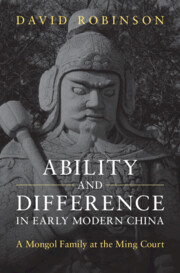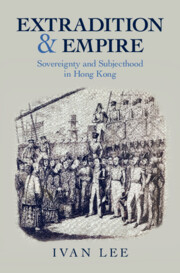Refine search
Actions for selected content:
616368 results in History
Index
-
- Book:
- Ability and Difference in Early Modern China
- Published online:
- 10 September 2025
- Print publication:
- 11 September 2025, pp 271-282
-
- Chapter
- Export citation
Contents
-
- Book:
- Ability and Difference in Early Modern China
- Published online:
- 10 September 2025
- Print publication:
- 11 September 2025, pp v-v
-
- Chapter
- Export citation
Tables
-
- Book:
- Black Catholic Worlds
- Published online:
- 28 August 2025
- Print publication:
- 11 September 2025, pp xi-xii
-
- Chapter
- Export citation
Appendices
-
- Book:
- Black Catholic Worlds
- Published online:
- 28 August 2025
- Print publication:
- 11 September 2025, pp 253-260
-
- Chapter
- Export citation
Maps
-
- Book:
- The Nature of the Ottoman City
- Published online:
- 28 August 2025
- Print publication:
- 11 September 2025, pp xi-xii
-
- Chapter
- Export citation
Dedication
-
- Book:
- The Nature of the Ottoman City
- Published online:
- 28 August 2025
- Print publication:
- 11 September 2025, pp v-vi
-
- Chapter
- Export citation
6 - “Wearing a Little Thin”: May 1968–March 1970
-
- Book:
- Less Than Victory
- Published online:
- 16 October 2025
- Print publication:
- 11 September 2025, pp 176-213
-
- Chapter
- Export citation
Dedication
-
- Book:
- Less Than Victory
- Published online:
- 16 October 2025
- Print publication:
- 11 September 2025, pp v-vi
-
- Chapter
- Export citation
Figures
-
- Book:
- Less Than Victory
- Published online:
- 16 October 2025
- Print publication:
- 11 September 2025, pp viii-viii
-
- Chapter
- Export citation
Appendices
- from Appendices
-
- Book:
- Black Catholic Worlds
- Published online:
- 28 August 2025
- Print publication:
- 11 September 2025, pp 254-255
-
- Chapter
- Export citation
Acknowledgments
-
- Book:
- The Nature of the Ottoman City
- Published online:
- 28 August 2025
- Print publication:
- 11 September 2025, pp xiii-xv
-
- Chapter
- Export citation
5 - “We Can and Must Debate”: January 1967–April 1968
-
- Book:
- Less Than Victory
- Published online:
- 16 October 2025
- Print publication:
- 11 September 2025, pp 141-175
-
- Chapter
- Export citation
6 - Far from Home
-
- Book:
- Ability and Difference in Early Modern China
- Published online:
- 10 September 2025
- Print publication:
- 11 September 2025, pp 138-162
-
- Chapter
- Export citation
Part III - Courts for a New Empire, 1816–1825
-
- Book:
- The Nation at Sea
- Published online:
- 28 August 2025
- Print publication:
- 11 September 2025, pp 189-278
-
- Chapter
- Export citation
5 - Representing the Emperor
-
- Book:
- Ability and Difference in Early Modern China
- Published online:
- 10 September 2025
- Print publication:
- 11 September 2025, pp 115-137
-
- Chapter
- Export citation

Ability and Difference in Early Modern China
- A Mongol Family at the Ming Court
-
- Published online:
- 10 September 2025
- Print publication:
- 11 September 2025

Extradition and Empire
- Sovereignty and Subjecthood in Hong Kong
-
- Published online:
- 10 September 2025
- Print publication:
- 03 July 2025
The Scottish urban hierarchy and its interaction with the print trade and venues for reading, as revealed by an 1820s trade directory
-
- Journal:
- Urban History , First View
- Published online by Cambridge University Press:
- 10 September 2025, pp. 1-18
-
- Article
-
- You have access
- Open access
- HTML
- Export citation
Modern Arab Kingship: Remaking the Ottoman Political Order in the Interwar Middle East. Adam Mestyan (Princeton, NJ: Princeton University Press, 2023). Pp. 352. $39.95 hardcover. ISBN 9780691190976
-
- Journal:
- International Journal of Middle East Studies , First View
- Published online by Cambridge University Press:
- 10 September 2025, pp. 1-2
-
- Article
- Export citation
Family ties under strain: negotiating failure, 1836–1846
-
- Journal:
- Continuity and Change , First View
- Published online by Cambridge University Press:
- 10 September 2025, pp. 1-21
-
- Article
- Export citation
